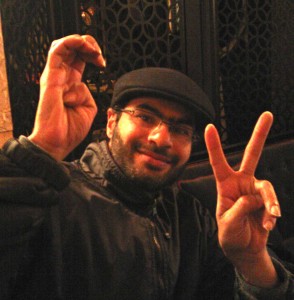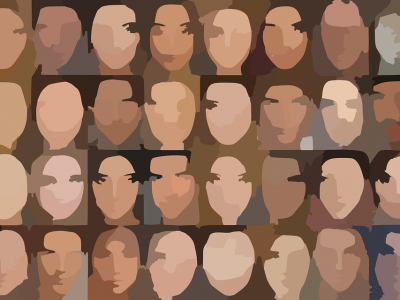
Ali Abdulemam on May 13, 2013 in Oslo, Norway. Photo by Hisham Almiraat.
Most of this report was researched, written, and edited by Lisa Ferguson, Weiping Li, Alex Laverty, Renata Avila, and Sarah Myers.
Global Voices Advocacy's Netizen Report offers an international snapshot of challenges, victories, and emerging trends in Internet rights around the world. This week we begin with the stories of two prominent political bloggers from Bahrain and Chad, both living in exile and facing unique challenges in the online and offline worlds.
Thuggery
Bahraini blogger, political activist, and Global Voices author Ali Abdulemam, who had been living in hiding in Bahrain for two years, appeared in London last week, where he has been granted political asylum by the British government. The founder of BahrainOnline.org, a leading website for political expression and opposition in the Gulf state, Abdulemam was an active organizer of uprisings in the country in 2011. While in hiding, he was tried in absentia by a military court and found guilty of charges related to terrorism and subversion. Abdulemam will speak this week at the Oslo Freedom Forum.
Chadian blogger Makaila Nguebla, who took exile in Senegal in 2005 after facing threats from government officials, has been exiled to Guinea by order of the Senegalese government. Nguebla was known for his critiques of President Idriss Déby who has ruled Chad for more than two decades. In an interview with Global Voices author Anna Gueye, Nguebla said he believes that Chad's Justice Minister pressured the Senegalese government to deny him political asylum and exile him to Guinea. Human Rights Watch suspects that this came as part of an ongoing crackdown in Chad.
Censorship
Syria suffered an Internet blackout on May 7, with service restored the following day. Renesys Corporation was the first to report the restoration of access, which was later confirmed by Akamai and BGPmon. Syrian Arabic News Agency attributed it to an optic cable malfunction, but Internet rights advocates were skeptical of this claim. The Electronic Frontier Foundation's Danny O'Brien wrote that the blackout implied “either a massive infrastructure cut, or a deliberate silencing of online communication.”
Sovereigns of Cyberspace
In apparent observance of US economic sanctions on Syria, US-based domain name registrar Network Solutions LLC and its parent company Web.com have seized control of over 700 domains belonging to Syrian entities, including the Syrian Electronic Army. The US Office of Foreign Assets Control permits the sale of “certain services for the exchange of personal communications over the Internet, such as instant messaging, chat and email,” so as not to limit communications mechanisms for Syrian citizens, but domain name registration is explicitly banned under the sanctions. Nevertheless, it appears that Network Solutions was acting on its own accord, not in response to a government request.
Internet Governance
A new top-level Internet domain, “.africa” will soon be introduced. The new domain, which aims to promote adoption by commercial entities throughout the continent, is fully endorsed by the African Union, according to BizTech Africa. The application is still being assessed by ICANN, but will likely be evaluated by May 15, with the delegation of the new gTLDs due in the third quarter of 2013.
The International Telecommunication Union, the UN agency charged with telecommunication regulation, will address Internet governance issues at the World Telecommunication Policy Forum in Geneva, May 14-16. Delegates will discuss the adoption of IPv6 protocol for Internet addresses, the expansion of broadband access, and “multistakeholderism” in net governance.
A group of bloggers and active Internet users in Cote d’Ivoire have elected their first “web representative”. oAfrica reports that “web mayor” Emmanuel Aswan, a graphic designer by training, will “work with a core Ivorian online community to create a safe, welcoming, and productive environment for all Ivorian web users.”
Surveillance
Wired has catalogued five Russian-made surveillance technologies that are currently used by Western nations, including voice recognition technologies, facial recognition technologies, mobile phone interception and bus tracking.
US-based civil liberties organizations are condemning the use of automated license plate readers as an invasion of privacy. Up to 14,000 plates can be scanned during a single police shift and put into a database, creating a detailed record of geospatial movements.
Intellectual Property
Negotiations for the Trans-Pacific Partnership Agreement continue in Lima this week. Multiple petitions concerning the treaty's potentially detrimental effects on freedom of expression and information have been organized in response. NGOs in Peru, led by digital rights group HiperDerecho, have launched a petition urging Peruvian President Ollanta Humala not to sign the agreement, if it should infringe on fundamental rights. Canadian NGO Open Media has also initiated a petition to recently nominated US Trade Representative Michael Froman, who will be responsible for negotiating the treaty. The petition calls on Froman to oppose the criminalization of certain online activities under the treaty.
The New Zealand Government will change its patent rules to exclude software programs from patentability. The decision was praised by the Institute of IT Professionals, New Zealand’s largest IT representative body, for removing a barrier to software-led innovation.
Cybersecurity
The US Pentagon’s annual report to Congress directly accused China’s military of conducting cyber attacks on American government computer systems and defense contractors, the most explicit cyber security-related accusation leveled on the Chinese government by the US government thus far. The report surmised that the attackers’ primary goal was to steal industrial technology, but that they also sought to gain insights into American policymakers’ thinking. China’s Ministry of Foreign Affairs responded by calling the accusations “groundless”.
Two command and control servers for FinFisher spyware were found in South Africa, according to a recent report by Citizen Lab. South African government agencies and telecommunications company Telkom have refused to comment on the accusations.
National Policy
Parliamentarians in Hungary took action to change the country's Freedom of Information Act (FOIA) in an effort to limit the scope of data accessible to the public under the law. Advocates suspect that the amendments were made in response to recent FOIA requests [hu] filed by a group of NGOs and media organizations concerning tobacco license tenders, as well as a FOIA-driven investigation of Parliamentary committee spending. Transparency organization Atlatszo.hu has posted a petition on Change.org [hu] calling on Hungarian president János Áder to withhold his signature from the amendment.
Netizen Activism
Transparency Morocco presented a set of best practices in fighting corruption at a Transparency International SpeakUp! event. The organization launched an online platform, Mamdawrinch.com (meaning “we will not bribe”) to anonymously crowdsource accusations of corruption.
Cool Things
Non-profit education organization Khan Academy has released a new course explaining digital alternative currency platform BitCoin through a series of videos.
Publications and Studies
-
Copyright in the Digital Era: Building Evidence for Policy — National Research Council, Board on Science, Technology, and Economic Policy
-
Media Laws & Regulations of the Gulf Cooperation Council Countries — Doha Centre for Media Freedom
-
Report of the Special Rapporteur on the promotion and protection of the right to freedom of opinion and expression — Frank La Rue (The UN Special Rapporteur of the right to freedom of opinion)
-
Protest at the speed of light: social networking the revolution — LINKS
Subscribe to the Netizen Report by email
For upcoming events related to the future of citizen rights in the digital age, see the Global Voices Events Calendar.



